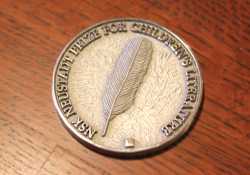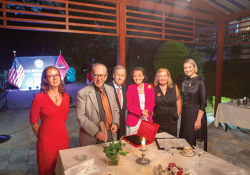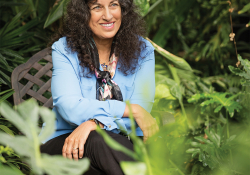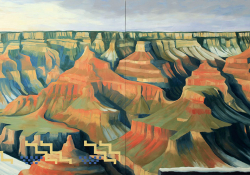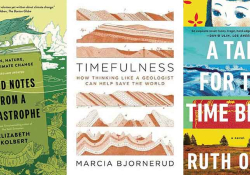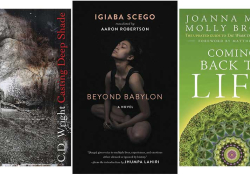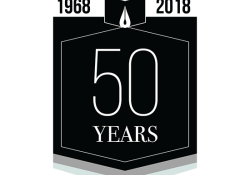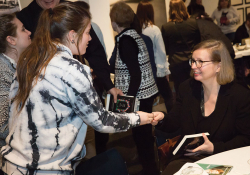Editors’ Picks: Summer Reads

Digital media editor Jen Rickard Blair’s summer reading picks range from multiethnic mystery to dystopian sci-fi. We suspect she’ll read these in a lawn chair or on the couch with her new dog snuggled up into a somewhat precarious position on Jen’s knees, shoulders, head, or toes.
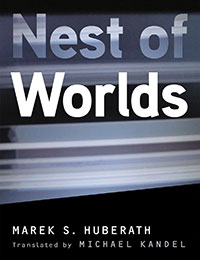 Nest of Worlds
Nest of Worlds
Marek S. Huberath. Michael Kandel, tr.
I recently read one of Marek Huberath’s sci-fi short stories and am very excited to read this novel, which is his first to appear in English. In this dystopian story, Huberath describes a world where the inhabitants are forced to move to a new “Land” every thirty-five years, and each land is a rigid caste society based on hair color. Addressing moral and philosophical issues, the story is a mysterious adventure that explores the space between love and the darkest aspects of human nature.
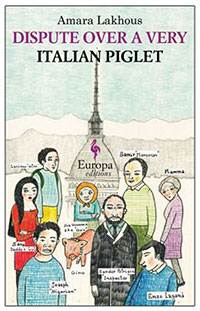 Dispute over a Very Italian Piglet
Dispute over a Very Italian Piglet
Amara Lakhous. Ann Goldstein, tr.
This new release by Amara Lakhous is a multi-ethnic mystery set in Turin, Italy. Against a backdrop of feuds between Albanians and Romanians in this northern Italian town, the book lightheartedly probes the trials and delights of life in a newly multicultural society. With a wry journalist and a piglet named Gino as leading characters, I’m hopeful this story will deliver a dose of comedy while also addressing the growing pains of diversity, respect, and inclusion among people of different cultures that share the same land.
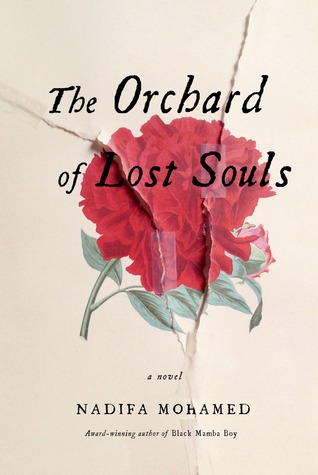 The Orchard of Lost Souls
The Orchard of Lost Souls
Nadifa Mohamed
The lives of three very different female characters—a nine-year-old from a vast refugee camp, a solitary widow, and a young female soldier—are “tied irrevocably together” in this story set in 1987 during Somalia’s civil war. I’m interested in reading this newest book by Mohamed to get a first-person perspective and a deeper understanding of the historic event as well as a greater empathy for the people who are always on the sidelines of revolution.
Though admittedly unfair to ask a book review editor to name only three summer reads, WLT’s Marla Johnson eventually relented with one concession: we let her work in a fourth as an addendum. Her picks reflect the breadth and depth of her reading as well as her passion for libraries.
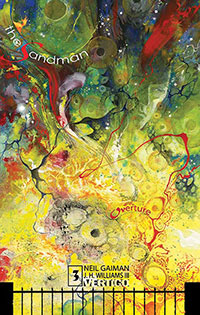 Sandman: Overture
Sandman: Overture
Neil Gaiman
As a fan of the original Sandman series, I am delighted by Vertigo’s publication of Neil Gaiman’s six-issue Overture prequel. The first issue in this new miniseries was released in late 2013, with the rest to follow in 2014. An amazing combination of literature, classic mythology, and creative artwork, this addition to Sandman is an enticing reason to read (or reread) the entire series.
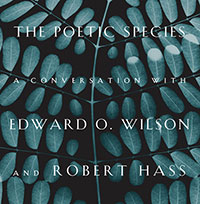 The Poetic Species: A Conversation with Edward O. Wilson and Robert Hass
The Poetic Species: A Conversation with Edward O. Wilson and Robert Hass
Stemming from a public conversation hosted by the American Museum of Natural History and Poets House, The Poetic Species explores the intersection of science and the arts in relation to the staggering environmental crisis the world is encountering. I am encouraged by this call to action by both scientific and literary communities and curious about the possible responses.
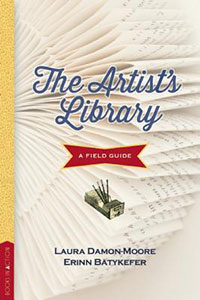 The Artist’s Library: A Field Guide
The Artist’s Library: A Field Guide
Erinn Batykefer & Laura Damon-Moore
I was delighted to discover The Artist’s Library, part of the Library as Incubator Project, whose mission “is to promote and facilitate creative collaboration between libraries and artists of all types . . .” This book, along with its supporting website, is filled with dynamic ideas to inspire all facets of the artistic impulse, whether it be writing, performing, or the visual arts. If you are in need of a touch of motivation to embark on a summer project, The Artist’s Library is the ideal place to start.
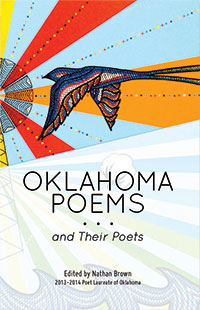 Although I’m only officially allowed three selections, I want to include a note about Oklahoma Poems and Their Poets, edited by Nathan Brown. I’m an advocate of homegrown and local, be it food or literature, and this summer I’ll be enjoying this delectable collection of more than forty poets with Oklahoma connections, right along with the best garden tomatoes imaginable.
Although I’m only officially allowed three selections, I want to include a note about Oklahoma Poems and Their Poets, edited by Nathan Brown. I’m an advocate of homegrown and local, be it food or literature, and this summer I’ll be enjoying this delectable collection of more than forty poets with Oklahoma connections, right along with the best garden tomatoes imaginable.
Our managing editor Michelle Johnson’s selections reflect her love of strong prose in both fiction and nonfiction as well as her abiding interest in law-themed lit.
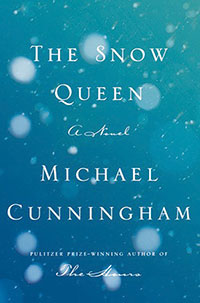 The Snow Queen
The Snow Queen
Michael Cunningham
Michael Cunningham’s new novel follows three characters: a man who has again lost love, his struggling-musician brother, and his brother’s seriously ill fiancée. The advance publicity describes the story as a search for transcendence that is “beautiful and heartbreaking, comic and tragic.” Could it be anything less in Cunningham’s hands?
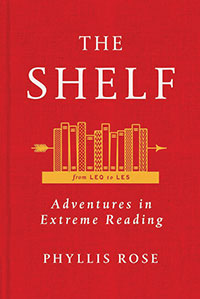 The Shelf: From LEQ to LES: Adventures in Extreme Reading
The Shelf: From LEQ to LES: Adventures in Extreme Reading
Phyllis Rose
I’m eager to watch Phyllis Rose’s mind at work as she reads through a random shelf of books in a public library. A biographer, memoirist, and essayist, Rose has been eloquently charting the connections between literature and life since the 1970s. Wherever this shelf takes her, I’m eager to follow.
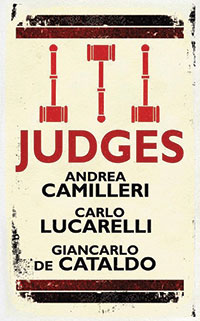 Judges
Judges
Andrea Camilleri, Carlo Lucarelli, & Giancarlo de Cataldo
The lawyer in me is looking forward to these translations of three novellas from Italian crime writers. With a nineteenth-century judge in a small Sicilian town, a young female judge who survives an assassin’s bullet, and a Kafkaesque tale of a lifelong feud between a prosecutor and a corrupt mayor, the collection promises three good law-and-lit poolside reads.
For WLT’s editor in chief Daniel Simon, his summer reading list takes him to Europe, where he studied abroad twenty-five years ago (1988–89), just as the communist regimes in the Eastern Bloc were beginning to implode. Yet even before the fall of the Berlin Wall and the start of the Velvet Revolution, and on the very day Poland’s Solidarity Party won 99 percent of the seats in national elections, tanks were rolling in to crush the protests in Beijing’s Tiananmen Square, half a world away. Looking back twenty-five years, what have we learned from those events?
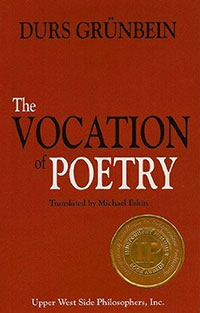 The Vocation of Poetry
The Vocation of Poetry
Durs Grünbein, Michael Eskin, tr.
Writing from the heart of Mitteleuropa, Durs Grünbein has been described as the best poet to emerge in Germany since the fall of the Berlin Wall (NYRB). The title piece of this recent collection—a speech delivered by Grünbein on the occasion of the fiftieth anniversary of the Frankfurt Poetry Lectures—starts out with a bold indictment: “If atrocities like [the Shoah] were possible, then the accusation that poetry is useless and insignificant seems justified.” If poetry is on trial here, I can’t wait to hear the prosecution’s arguments—but I suspect that Grünbein is a witness for the defense.
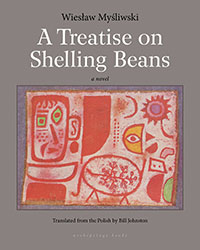 A Treatise on Shelling Beans
A Treatise on Shelling Beans
Wiesław Myśliwski, Bill Johnston, tr.
While mulling prospective authors to feature in our November 2014 issue—which will focus on central European literature twenty-five years after the Wende—one of my mentors recommended three writers: Karl Ove Knausgård, Wiesław Myśliwski, and Aleksandar Hemon: “In part they represent the new generation of global writers from Europe, in part (Myśliwski) the discovery of an older generation.” I’m eager to discover Myśliwski’s latest work, thanks to the work of award-winning translator Bill Johnston.
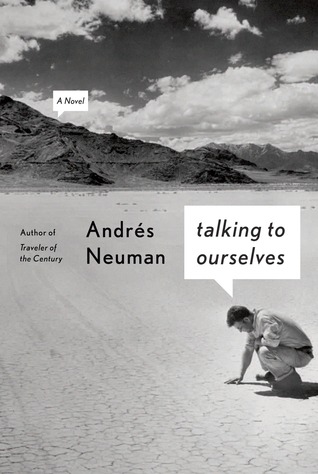 Talking to Ourselves
Talking to Ourselves
Andrés Neuman, Nick Caistor & Lorenza Garcia, tr.
Of all the countries I visited in 1988–89—France, Italy, Austria, Czechoslovakia, Poland, Germany, and England—the one I regret most not having visited was Spain, especially since where I was studying in southern France was less than five hours away from Barcelona by train. Until I actually get there on my own, I’ll imagine the country through the eyes of a brilliant guide like Neuman.

